The internet space today faces immense challenges whereby websites bear immense dangers. There are cases such as Distributed Denial-of-Service (DDoS) attacks in which the attackers flood the website with requests to make it impossible for the server to respond.
Netscout a cyber security firm has observed only in the year 2023 there are over 10 million cases of DDoS. These attacks can paralyze websites and cost their owners money, reputation, time, and users’ patience.
Thus, modern businesses require effective and efficient DDoS protection software. This software works as a protective barrier, blocking unsafe traffic and letting your web resource be available to users.
In fact, the availability of a great number of solutions in the market that aim to protect from DDoS attacks sometimes makes it difficult to select the most appropriate one.
Further, this article will guide you through the available choices and decide on the most suitable software for DDoS protection that will protect your online identity.
How can application layer DDoS attacks be detected?
Application layer DDoS protection is important because it protects against sophisticated attacks that target specific parts of an application or service, unlike excessive network bandwidth volumetric attacks that flood the network with traffic.
The application layer (layer 7) attack is intended to destroy server resources or exploit vulnerabilities in application logic. This type makes attack detection and mitigation difficult because it closely mimics legitimate user traffic.
Effective application layer DDoS protection monitors incoming traffic at the application layer, analyzing requests to detect anomalies or malicious configuration. It separates genuine users from intruders using strategies including rate limitation, CAPTCHA difficulties, and behavioral analysis.
This protection minimizes service disruption, preserves productivity, and guarantees availability to actual users by screening harmful traffic before it reaches the application server.
In addition, application layer security enhances the level of security by addressing vulnerabilities in web applications, APIs, and other user-friendly services. It helps businesses continue to operate, preserving customer trust, and protecting sensitive data from being stolen or compromised during an attack.
In today’s threat landscape, where DDoS attacks are becoming more sophisticated, strong application-level defenses are inevitable to protect against targeted and evolving cyber threats.
How Does DDoS Protection Software Work?
The process that software operates is by detecting, reducing, and obstructing hostile traffic that tries to breach a network or application.
1. Traffic Monitoring and Analysis: The software continuously monitors incoming traffic patterns, analyzes data packets and identifies anomalies that may indicate DDoS attacks. It distinguishes between legitimate users and bad requests.
2. Attack detection: By detecting suspicious patterns the software uses algorithms and heuristics to determine if the traffic is a DDoS attack. It analyzes factors such as traffic volume, frequency of requests, and unusual behavior.
3. Mitigation measures: Depending on the nature and severity of the attack, the software initiates mitigation measures. This may require rerouting traffic to negative collection points before reaching the target network .Attack avoidance techniques have also included rate limits, IP filtering, and challenge-response methods (like CAPTCHA)..
4.Redundancy and Scalability: DDoS defense software is made to be redundancy- and scalable-aware, meaning that it is capable of handling unexpected surges in traffic during an attack without sacrificing efficiency.
5. Real-Time Reporting and Analysis: The software provides real-time reporting and analysis throughout the attack and attack, providing information on attack type, mitigation effort effectiveness, and recommendation varieties that will improve future resilience for .
10 Best DDoS Protection Software
1. Arbor Networks
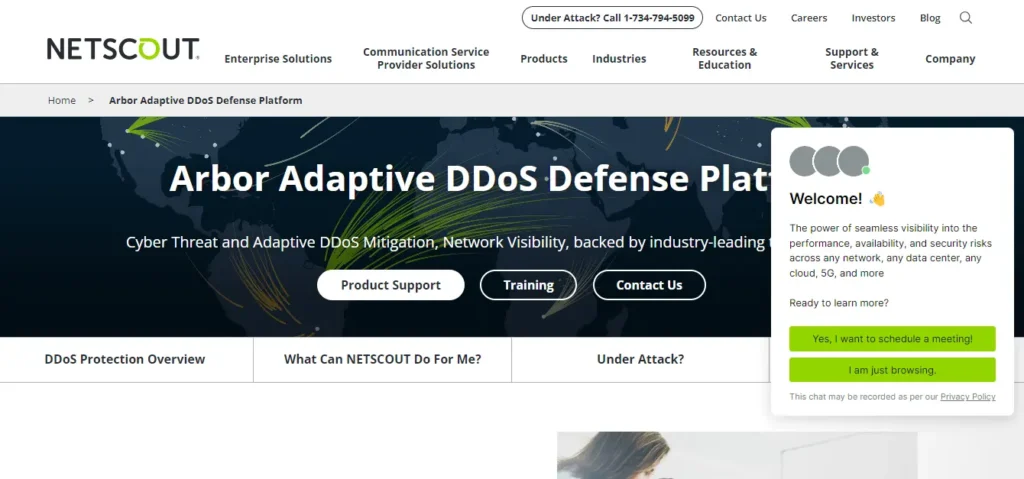
Arbor Networks provides comprehensive DDoS protection through its Arbor Cloud and Arbor Edge Defense (AED) solutions. The Arbor Cloud protects against large, slow attacks, while the AED is known for its neutrality, making it ideal for defensive environments. The combination of cloud-based mitigation and premises defense provides robust protection against various types of attacks. Arbor’s ATLAS Intelligence Feed enhances threat detection with millions of Indicators of Compromise (IoCs). Their services include 24/7 managed monitoring, comprehensive reporting, and leading-edge SIEM system integration. Arbor Networks is ideal for organizations seeking advanced threat intelligence and proactive security strategies
Pros:
– Advanced Threat Intelligence capabilities with the ATLAS Intelligence Feed enhance threat detection.
– Integration with major SIEM systems provides comprehensive security management.
– Proactive threat detection methods help mitigate potential issues before they escalate.
Cons:
– The complexity of the system can present a steep learning curve for users.
– Lack of transparent pricing information makes it difficult to assess cost-effectiveness.
– May require dedicated staff for full utilization and understanding of features
Pricing:
Custom pricing
2. AWS Shield
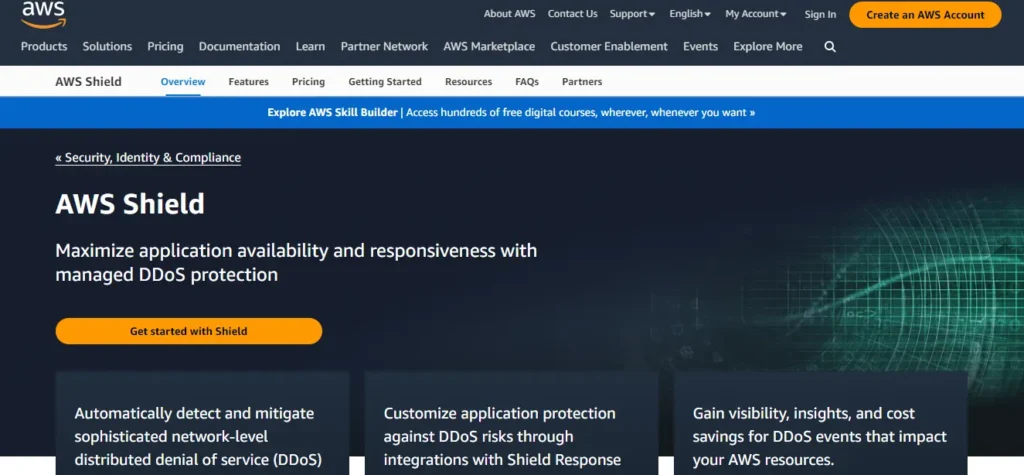
Applications that operate on Amazon Web Services are best suited for AWS-hosted DDoS prevention services like AWS Shield. There are two levels available: Standard, which provides basic and free protection, and Advanced, which costs $3,000 a month and provides comprehensive security. Features including real-time attack analysis, DDoS cost prevention, and round-the-clock assistance from the AWS Shield Response Team are all included with AWS Shield Advanced. Its smooth interaction with other AWS services, such Route 53 and CloudFront, guarantees robust defense against large-scale, unexpected DDoS attacks
Pros:
– Scalable protection integrated seamlessly with AWS infrastructure.
– Offers two tiers for varying levels of defense, including a free standard tier.
– Provides 24/7 support from the AWS Shield Response Team for advanced users.
Cons:
– Advanced protection comes with a high cost ($3,000 per month).
– Relies heavily on AWS services, which may limit flexibility.
– Potentially limited compared to specialized DDoS solutions
Pricing:
| Plans | Price |
|---|---|
| Monthly Fee | $3,000.00 |
Suggested Read – Payroll Software for Small Business
3. Cloudflare
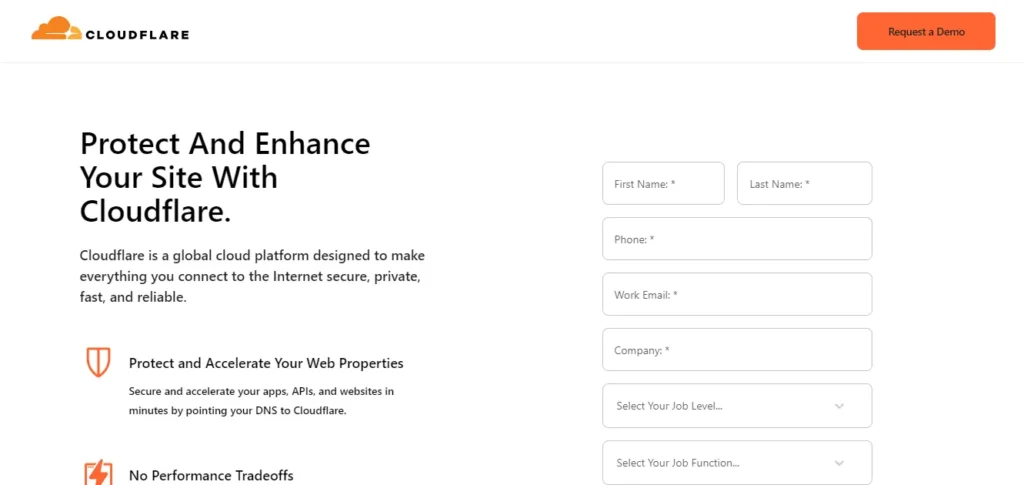
Cloudflare offers an extensive DDoS protection suite as part of its comprehensive web performance and security strategy. It reduces attacks on its network edge, ensuring minimal latency and uninterrupted operation. Protection against all kinds of threats is provided by Cloudflare, which also readily integrates with the present technology. The site is renowned for being easy to use and having clear pricing. With the help of Cloudflare’s powerful analytics and reporting capabilities, users may more effectively identify and address threats
Pros:
– Provides extensive DDoS protection at all layers with minimal latency.
– User-friendly interface and transparent pricing.
– Advanced analytics and reporting tools for better threat management.
Cons:
– May have limitations in advanced customization options.
– Heavy reliance on Cloudflare’s network infrastructure.
– Potential for over-reliance on the automated systems without manual oversight
Pricing:
Free
4. Imperva
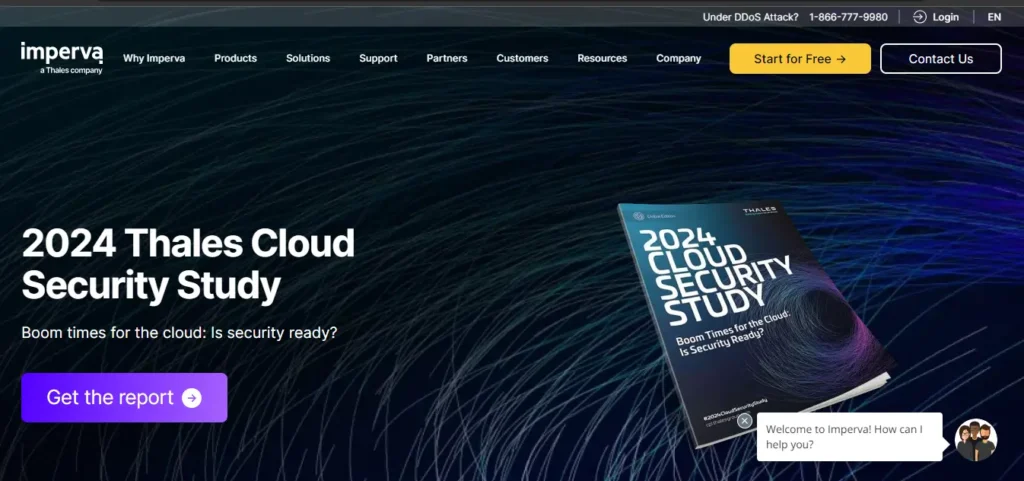
The Imperva DDoS protection service leverages a global network of more than 50 point of presence (PoPs) for rapid mitigation backed by a three-second SLA for all types of attacks It enables real-time threat detection through its Attack Analytics automatic protection system . Imperva integrates seamlessly with SIEM systems and other security tools, making it a viable choice for companies seeking robust, scalable DDoS protection
Pros:
– Rapid mitigation with a three-second SLA for all attack types.
– Real-time visibility into threats through Attack Analytics.
– Supports self-adaptive security policies and seamless SIEM integration.
Cons:
– Limited customization options can be restrictive.
– Lack of transparent pricing information.
– Strict adherence to SLA required for optimal performance
Pricing:
Custom pricing
5. F5 Silverline
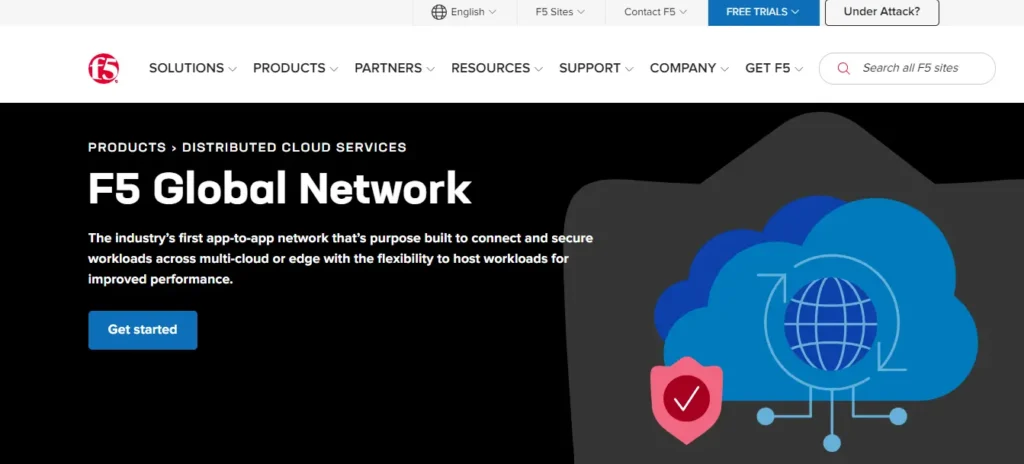
F5 Silverline offers an adaptable combination security solution by fusing physical assets with cloud-based security services. Web Application Firewall (WAF), DDoS defense, and managed security services are included in this.This flexibility allows organizations to adapt their hedging strategies to specific needs. Silverline integrates seamlessly with various network and cloud platforms, although full implementation may require specialized personnel
Pros:
– Flexible hybrid defense combining cloud and on-premises solutions.
– Highly customizable to fit specific organizational needs.
– Integrates with a wide range of network and cloud platforms.
Cons:
– Lack of transparent pricing information.
– Complexity may require specialized staff or training.
– Potential for underutilization of capabilities due to an overabundance of features
Pricing:
Custom pricing
6. Akamai Kona Site Defender
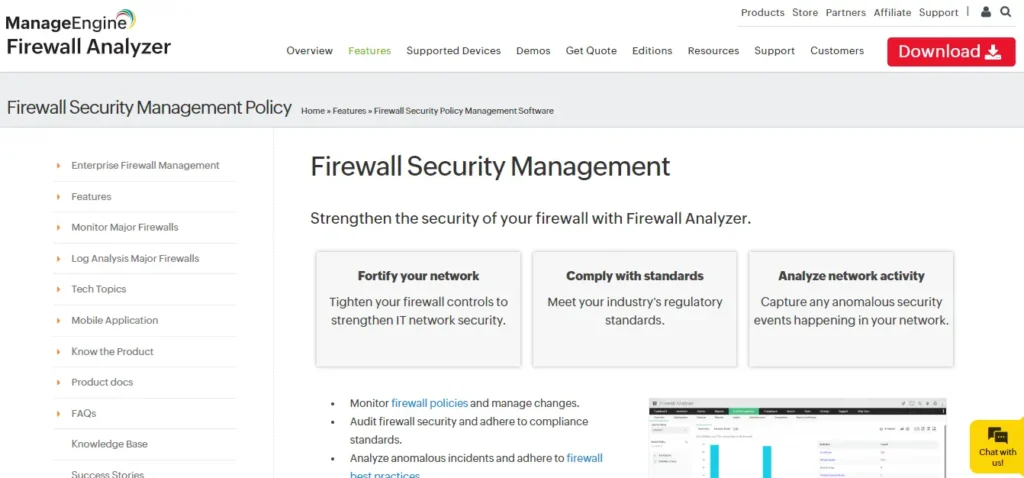
The Intelligent Edge Platform from Akamai includes WAF and complete DDoS protection, including Akamai Kona Site Defender. It guarantees the availability and functionality of applications while saving against extensive attacks.Kona Site Defender leverages Akamai’s large CDN network for fast response and minimal latency. Businesses in need of scalable, high-performance DDoS mitigation with online security features should use this service
Pros:
– Comprehensive DDoS protection integrated with web security features.
– Rapid response and minimal latency due to Akamai’s CDN network.
– Scalable solution suitable for high-performance requirements.
Cons:
– Can be complex to configure and manage.
– Higher cost compared to some competitors.
– Reliance on Akamai’s infrastructure may limit flexibility
Pricing:
Custom Pricing
7. Gcore
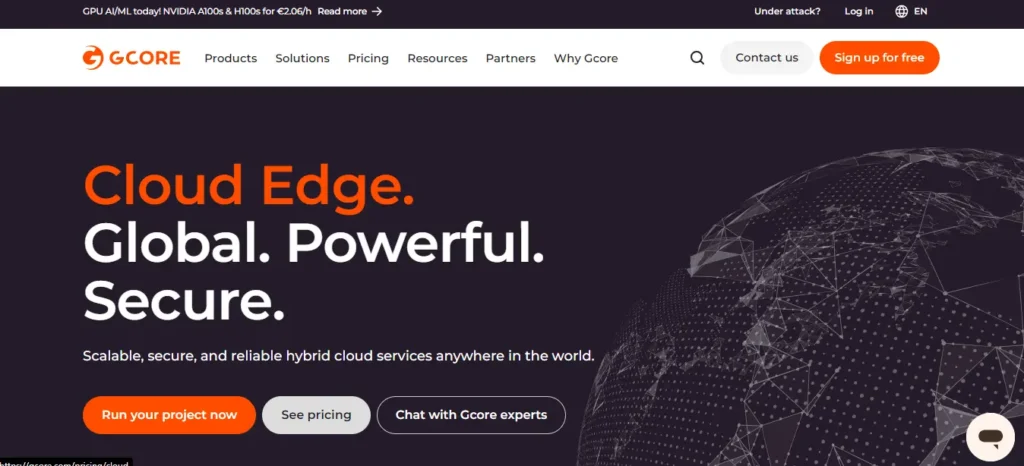
Gcore offers robust DDoS protection with real-time bot protection and advanced firewall capabilities. Its applications include L3, L4, and L7 defenses, making it suitable for a variety of attack vectors. Gcore’s tiered pricing model and scalable solutions cater to businesses of varying sizes. But its pricing structure can be complex, the service can require a lot of technical expertise
Pros:
– Robust DDoS protection with real-time bot protection and advanced firewall capabilities.
– Tiered pricing model and customizable solutions.
– Effective protection at L3, L4, and L7 attack layers.
Cons:
– Complex pricing structure.
– May require substantial technical knowledge to manage effectively.
– Potential limitations in scalability for very large enterprises
Pricing:
| Plans | Price |
|---|---|
| START | $2.6/Mbps |
| PRO | $2.6/Mbps |
| CUSTOM | CUSTOM |
8. Sucuri Website Firewall
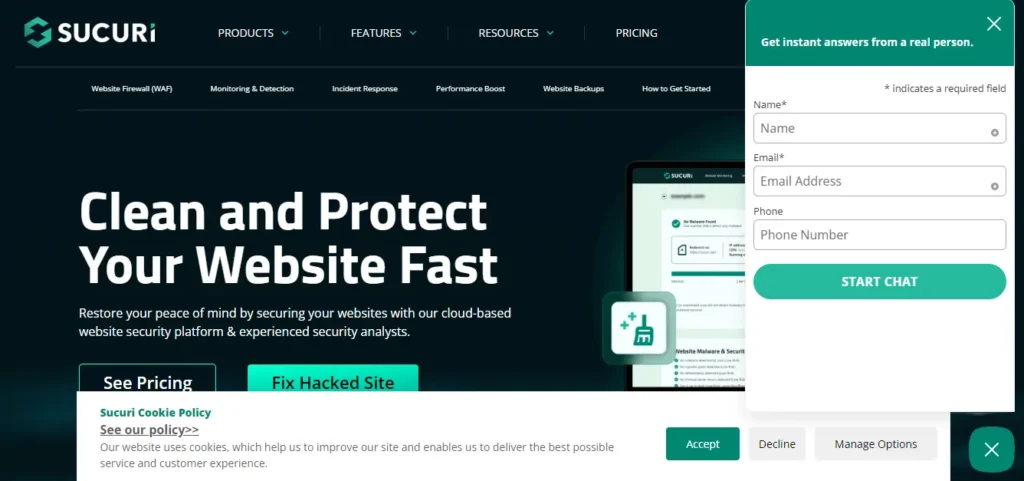
Sukuri offers cloud-based DDoS protection that filters traffic before it reaches the network. It uses geo-blocking and IP whitelisting to enhance security and offers four pricing tiers to meet different needs. Sukuri services include routine scanning and emergency repair procedures, making it suitable for small businesses and those in need of immediate protection during an attack
Pros:
– Emergency repair service available even when already under attack.
– Regular scans and content delivery network offloading enhance security.
– Affordable pricing tiers suitable for small businesses.
Cons:
– No self-hosting option, as it is a cloud-based service.
– Limited advanced customization options.
– Reliance on Sucuri’s infrastructure for protection
Pricing:
| Plans | Price |
|---|---|
| Basic Platform | $199.99/yr |
| Pro Platform |
$299.99/yr |
| Business Platform |
$499.99/yr |
| Junior Dev | $999.98/yr |
| Multi-Site & Custom Plans | Price upon request |
Also Read – AI Tools for Network Monitoring
9. Indusface AppTrana
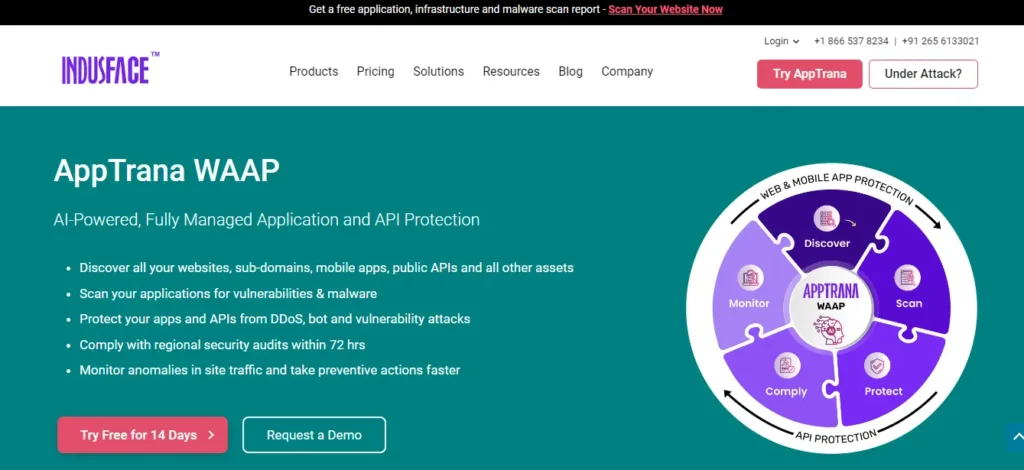
Indusface AppTrana is a managed DDoS, WAF, and bot solution. It offers meterless service, application security scanning, and API security. The service is built on AWS, providing robust protection against volumetric attacks and client-based detection. AppTrana’s managed approach ensures constant monitoring and rapid response to threats, making it a strong choice for complete network security
Pros:
– Fully managed DDoS, WAF, and bot mitigation solution.
– Unmetered service with 24/7 monitoring and response.
– Built on AWS for robust volumetric attack resistance.
Cons:
– May have a higher cost for advanced features.
– Reliance on Indusface’s managed service.
– Potential limitations in customization compared to in-house solutions
Pricing:
| Plans | Price |
|---|---|
| Advance | $99/Monthly |
| Premium | $399/Monthly |
| Enterprise | Custom/Monthly |
10. FortiDDoS
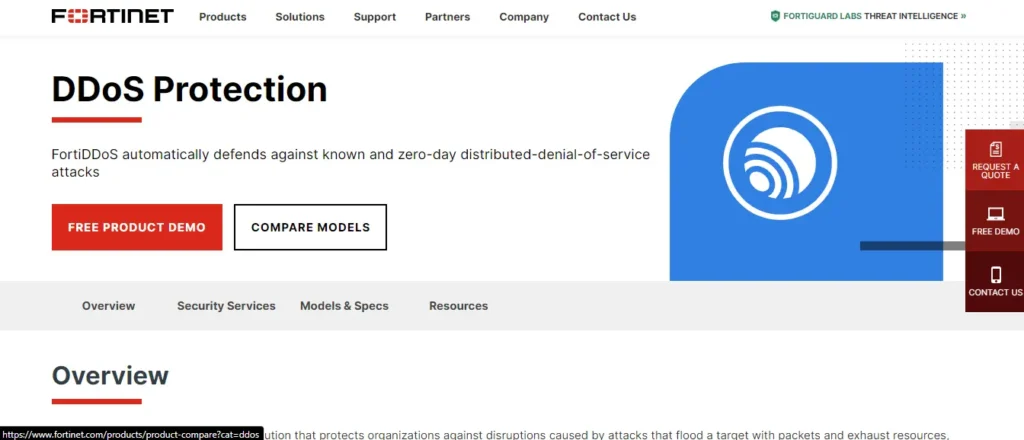
FortiDDoS by Fortinet provides behavior-based attack mitigation using dedicated hardware devices. It provides protection against known attacks and everyday unreliable file signing. FortiDDoS reduces false positives and latency, making it seamless during an attack. The self-contained capability of the solution reduces the need for manual intervention, optimizing large-scale projects with stringent security requirements
Pros:
– Behavior-based attack mitigation with dedicated hardware appliances.
– No reliance on signature files, reducing latency and false positives.
– Autonomous capabilities minimize the need for manual intervention.
Cons:
– May require significant investment in dedicated hardware.
– Complexity of setup and management.
– Higher initial cost compared to software-only solutions
Pricing:
Custom pricing
Ending Note
Finding the best DDoS protection software is necessary to keep your online presence safe and strong. Prominent solutions with cutting-edge technologies to efficiently detect and reduce DDoS assaults include Arbor Networks, Akamai, and Cloudflare.
Cloudflare’s extensive global network and user-friendly interface provide robust protection with minimal latency. Akamai is renowned for its ability to handle large volumes of traffic and offers sophisticated security intelligence, making it ideal for enterprises. With its real-time threat detection and powerful analytics, Arbor Networks stands out. It also offers flexible traffic control to meet specific security requirements.
Purchasing superior DDoS protection services protects your brand and fosters client trust in addition to ensuring business continuity. Businesses may maintain a secure digital environment and successfully defend against changing cyber threats by adopting state-of-the-art technology and experienced support from these suppliers.
FAQ’S
1. What is DDoS protection software
This protection software is designed to detect and mitigate distributed denial of service (DDoS) attacks, which attempt to infect a network or website and make it accessible
2. Why is DDoS protection important?
DDoS attacks can disrupt online services, causing downtime, lost revenue, and reputational damage. Effective DDoS protection helps mitigate these risks by blocking suspicious traffic and keeping the service running.
3. What features should I look for in this protection software?
Look for software that provides real-time monitoring, passive attack detection, mitigation capabilities, and robust reporting. Additionally, consider features like geolocation, SSL security, and support for multiple protocols.
4. How can software for DDoS protection help my business?
Implementing this software can protect your online presence, ensure business continuity, protect customer data, and maintain your brand reputation from cyber threats















